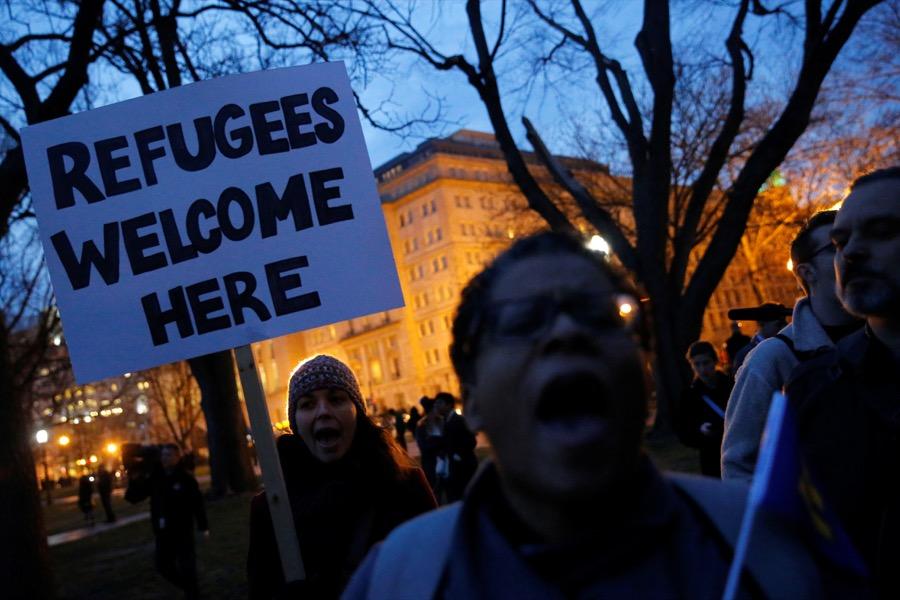A judge in Hawaii just blocked Trump’s revamped immigration order
Demonstrators rallied against the Trump administration's new ban on new refugees and against travelers from six Muslim-majority nations, outside the White House in Washington on March 6.
A federal court in Hawaii on Wednesday halted Donald Trump's revised executive order temporarily closing US borders to refugees and nationals from six Muslim-majority countries, dealing the president a humiliating fresh defeat.
US District Judge Derrick Watson ruled that the state of Hawaii, in its legal challenge to the order, had established a strong likelihood that the ban would cause "irreparable injury" were it to go ahead.
The court in Honolulu was the first to rule in a trio of legal challenges against the ban, which had been set to go into effect at midnight.
Decisions were expected later Wednesday from federal courts in Washington state and Maryland.
The ruling means a nationwide freeze on enforcement of section two of the order, banning entry by nationals of Iran, Libya, Somalia, Sudan, Syria and Yemen for 90 days.
It also halts section six, which would have suspended the US refugee admissions program for 120 days.
Trump was giving a televised speech to a rally in Nashville when he denounced the court decision.
"This ruling makes us look weak," he said. "The danger is clear. The law is clear. The need for my executive order is clear."
Trump has argued that the travel ban is necessary to keep extremists from entering the US, although judges have repeatedly requested evidence of the security threat posed by nationals named in his executive orders.
Trump went on to call the court decision "an unprecedented judicial overreach," claiming it was "done by a judge for political reasons." He pledged to challenge it as far as the Supreme Court if needed.
The Trump administration's wide-ranging initial travel restrictions imposed on Jan. 27 were suspended by the federal courts, after sparking a legal, political and logistical furor.
Trump signed a revised ban behind closed doors on March 6 with a reduced scope, exempting Iraqis and permanent US residents but maintaining the temporary ban on the other six countries and refugees from around the world. The prior order had also singled out Syrian refugees to be barred indefinitely, which was scrapped in the new version.
The White House said the six countries were targeted because their screening and information capabilities could not meet US security requirements.
But Watson rejected the White House claim that the order wasn't a Muslim ban, ruling that it would not be a leap "to conclude that targeting these countries likewise targets Islam," because their Muslim populations range from 90.7 percent to 99.8 percent.
The judge made reference to several examples of Trump explicitly framing proposed action on immigration in religious language, including a March 2016 interview during which the then president-elect said: "I think Islam hates us."
"Mr. Trump was asked, 'Is there a war between the West and radical Islam, or between the West and Islam itself?' He replied: 'It's very hard to separate. Because you don't know who's who,'" the judge added.
Immigration lawyers noted what they considered "strong language" used by the judge in his statement.
Maryland case
In Greenbelt, Maryland, Judge Theodore Chuang was expected to rule on a separate complaint filed by a coalition of advocacy groups that the amended order discriminates against Muslims.
"In his mind, the danger of Muslims and the danger of refugees is all combined danger," Omar Jadwat, a lawyer for the American Civil Liberties Union, said of the president.
The first version of Trump's order triggered protests at home and abroad as well as chaos at US airports as people were detained upon arrival and either held for hours or sent back to where they came from.
The Trump administration narrowed the restrictions in its revised order to try to ensure it would be unassailable this time around.
"This order doesn't draw any religious distinction at all," said Jeffrey Wall, a government attorney.
Questioned about tweets that Trump sent and statements he made during the presidential campaign in which he promised to enact a "Muslim ban," Wall said: "There is a difference between a president and a candidate."
Coast to coast
But critics say the new order essentially remains a ban on Muslims coming to the United States, and therefore unconstitutional because it singles out people of a certain religion for discrimination.
Since Sept. 11, 2001, the worst attacks in the United States have been committed either by radicalized Americans or by people from countries not on the Trump travel ban list.
Critics also argue that it will have a very negative effect on schools, universities and the business world, mainly the high tech sector, which employs many highly skilled immigrants.
The new battle against Trump's order is being played out on several geographical fronts, but mainly on the west coast, which tends to be pro-Democrat.
The state of Washington, joined by five other states, filed a complaint Monday with the same Seattle judge who stayed Trump's original travel ban in February.
Trump responded by insulting that federal magistrate, James Robart, calling him a "so-called judge."
Robart was overseeing the Washington state hearing on Wednesday when the Hawaii ruling came, and he could once again suspend all or part of the new order.
By AFP's Kent Nishimura in Honolulu, with Frankie Taggart in Los Angeles and Sebastien Blanc in Greenbelt
